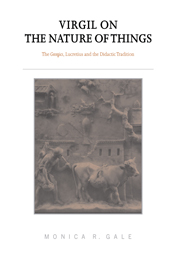Book contents
- Frontmatter
- Contents
- Preface
- List of abbreviations
- 1 Introduction: influence, allusion, intertextuality
- 2 Beginnings and endings
- 3 The gods, the farmer and the natural world
- 4 Virgil's metamorphoses: mythological allusions
- 5 Labor improbus
- 6 The wonders of the natural world
- 7 The cosmic battlefield: warfare and military imagery
- 8 Epilogue: the philosopher and the farmer
- Bibliography
- Index of passages cited
- General index
4 - Virgil's metamorphoses: mythological allusions
Published online by Cambridge University Press: 15 October 2009
- Frontmatter
- Contents
- Preface
- List of abbreviations
- 1 Introduction: influence, allusion, intertextuality
- 2 Beginnings and endings
- 3 The gods, the farmer and the natural world
- 4 Virgil's metamorphoses: mythological allusions
- 5 Labor improbus
- 6 The wonders of the natural world
- 7 The cosmic battlefield: warfare and military imagery
- 8 Epilogue: the philosopher and the farmer
- Bibliography
- Index of passages cited
- General index
Summary
In chapter 3, I suggested that connexions can be established between ambiguities in Virgil's treatment of the gods and the natural environment, and the shifting balance of intertextual relations which underlies the text of the Georgics. The stance of the didactic narrator is sometimes Lucretian, sometimes Hesiodic or Aratean; frequently these different voices clash with each other, and their divergent views are juxtaposed in such a way that tensions and conflicts are emphasized rather than resolved. Lucretius' clear-cut and rationalistic world-view is particularly subject to challenge by these means; Virgil constantly problematizes the Epicurean conviction that all natural phenomena are readily explicable in scientific terms, either by bringing Lucretius into conflict with his other didactic intertexts, or by alluding simultaneously to passages of the DRN which can be made to seem contradictory, or by using Lucretian language to frame un-Lucretian ideas. Similar strategies can be traced in Virgil's treatment of myth, which can be seen in part as a response to Lucretius' complex and subtle use of mythological language and imagery.
I have argued elsewhere that Lucretius' use of myth is the product of an innovative and sophisticated theory of its nature and origins. In two important passages, the discussions of the origins of religion in DRN 5.1161–1240 and of the phenomenon of echoes in 4.580–94, the poet sketches the outlines of a theory which would account for the creation of mythology. Early men (or ignorant rustics) observe the heavens or strange terrestrial phenomena which they are unable to explain.
- Type
- Chapter
- Information
- Virgil on the Nature of ThingsThe Georgics, Lucretius and the Didactic Tradition, pp. 113 - 142Publisher: Cambridge University PressPrint publication year: 2000



